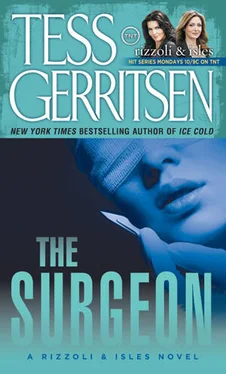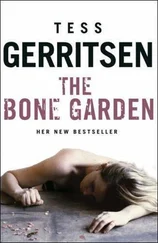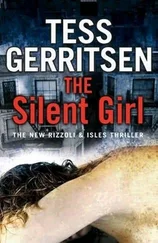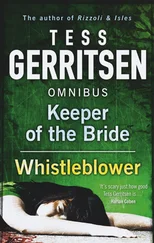He turned from the bedroom doorway and walked out to the living room, where he sat down on the couch. The late afternoon sun streamed through the window and its brightness stung his eyes. He rubbed them and dropped his head in his hands, afflicted by guilt that he had not thought of Mary all day. For that he felt ashamed. He felt even more ashamed when he raised his head to look at Catherine and all thoughts of Mary instantly vanished. He thought: This is the most beautiful woman I’ve ever known.
The most courageous woman I’ve ever known.
“There’s nothing missing,” she said. “Not as far as I can tell.”
“Are you sure you want to stay here? I’d be happy to bring you to a hotel.”
She crossed to the window and stared out, her profile lit by the golden light of sunset. “I’ve spent the last two years being afraid. Locking out the world with dead bolts. Always looking behind doors and searching closets. I’ve had enough of it.” She looked at him. “I want my life back. This time I won’t let him win.”
This time, she had said, as though this was a battle in a much longer war. As though the Surgeon and Andrew Capra had blended into a single entity, one she had briefly subdued two years ago but had not truly defeated. Capra. The Surgeon. Two heads of the same monster.
“You said there’d be a patrol car outside tonight,” she said.
“There will be.”
“You guarantee it?”
“Absolutely.”
She took a deep breath, and the smile she gave him was an act of sheer courage. “Then I have nothing to worry about, do I?” she said.
It was guilt that made him drive toward Newton that evening instead of going straight home. He had been shaken by his reaction to Cordell and troubled by how thoroughly she now monopolized his thoughts. In the year and a half since Mary’s death, he had lived a monk’s existence, feeling no interest whatsoever in women, all passions dampened by grief. He did not know how to deal with this fresh spark of desire. He only knew that, given the situation, it was inappropriate. And that it was a sign of disloyalty to the woman he had loved.
So he drove to Newton to make things right. To assuage his conscience.
He was holding a bouquet of daisies as he stepped into the front yard and latched the iron gate behind him. It’s like carrying coals to Newcastle, he thought, looking around at the garden, now falling into the shadows of evening. Every time he visited, there seemed to be more flowers crammed into this small space. Morning glory vines and rose canes had been trained up the side of the house, so that the garden seemed to be expanding skyward as well. He felt almost embarrassed by his meager offering of daisies. But daisies were what Mary had loved best, and it was almost a habit for him now, to choose them at the flower stand. She’d loved their cheery simplicity, the fringes of white around lemony suns. She’d loved their scent — not sweet and cloying like other flowers, but pungent. Assertive. She’d loved the way they sprang up wild in vacant lots and roadsides, reminders that true beauty is spontaneous and irrepressible.
Like Mary herself.
He rang the bell. A moment later the door swung open, and the face that smiled at him was so much like Mary’s, he felt a familiar twinge of pain. Rose Connelly had her daughter’s blue eyes and round cheeks, and although her hair was almost entirely gray and age had etched its mark on her face, the similarities left no doubt that she was Mary’s mother.
“It’s so good to see you, Thomas,” she said. “You haven’t been by lately.”
“I’m sorry about that, Rose. It’s hard to find time lately. I hardly know which day it is.”
“I’ve been following the case on the TV. What a terrible business you’re in.”
He stepped into the house and handed her the daisies. “Not that you need any more flowers,” he said wryly.
“One can never have too many flowers. And you know how much I love daisies. Would you like some iced tea?”
“I’d love some, thank you.”
They sat in the living room, sipping their tea. It tasted sweet and sunny, the way they drank it in South Carolina where Rose was born. Not at all like the somber New England brew that Moore had grown up drinking. The room was sweet as well, hopelessly old-fashioned by Boston standards. Too much chintz, too many knickknacks. But oh, how it reminded him of Mary! She was everywhere. Photos of her hung on the walls. Her swimming trophies were displayed on the bookshelves. Her childhood piano stood in the living room. The ghost of that child was still here, in this house where she had been raised. And Rose was here, the keeper of the flame, who looked so much like her daughter that Moore sometimes thought he saw Mary herself gazing from Rose’s blue eyes.
“You look tired,” she said.
“Do I?”
“You never went on vacation, did you?”
“They called me back. I was already in the car, heading up the Maine Turnpike. Had my fishing poles packed. Bought a new tacklebox.” He sighed. “I miss the lake. It’s the one thing I look forward to all year.”
It was the one thing Mary had always looked forward to as well. He glanced at the swimming trophies on the bookshelf. Mary had been a sturdy little mermaid who would happily have lived her life in the water had she been born with gills. He remembered how cleanly and powerfully she had once stroked across the lake. Remembered how those same arms had wasted away to twigs in the nursing home.
“After the case is solved,” said Rose, “you could still go to the lake.”
“I don’t know that it will be solved.”
“That doesn’t sound like you at all. So discouraged.”
“This is a different sort of crime, Rose. Committed by someone I can’t begin to understand.”
“You always manage to.”
“Always?” He shook his head and smiled. “You give me too much credit.”
“It’s what Mary used to say. She liked to brag about you, you know. He always gets his man. ”
But at what cost? he wondered, his smile fading. He remembered all the nights away at crime scenes, the missed dinners, the weekends when his mind was occupied only by thoughts of work. And there had been Mary, patiently waiting for his attention. If I had just one day to relive, I would spend every minute of it with you. Holding you in bed. Whispering secrets beneath warm sheets.
But God grants no such second chances.
“She was so proud of you,” Rose said.
“I was proud of her.”
“You had twenty good years together. That’s more than most people can say.”
“I’m greedy, Rose. I wanted more.”
“And you’re angry you didn’t get it.”
“Yes, I suppose I am. I’m angry that she had to be the one with the aneurysm. That she was the one they couldn’t save. And I’m angry that—” He stopped. Released a deep breath. “I’m sorry. It’s just hard. Everything is so hard these days.”
“For both of us,” she said softly.
They gazed at each other in silence. Yes, of course it would be even harder for widowed Rose, who had lost her only child. He wondered whether she would forgive him if he ever remarried. Or would she consider it a betrayal? The consignment of her daughter’s memory to an even deeper grave?
Suddenly he found he could not hold her gaze, and he glanced away with a twinge of guilt. The same guilt he’d felt earlier that afternoon when he’d looked at Catherine Cordell and felt the unmistakable stirring of desire.
He set down his empty glass and rose to his feet. “I should be going.”
“So it’s back to work already?”
“It doesn’t stop until we catch him.”
She saw him to the door and stood there as he walked through the tiny garden to the front gate. He turned and said, “Lock your doors, Rose.”
Читать дальше












